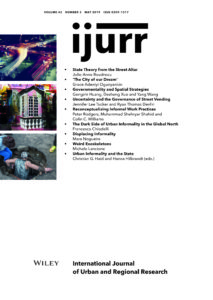The Hong Kong government’s neoliberal approach regarding land development and urbanization affects not only the housing market but also burial places, increasing inequality for both the living and the dead. The urgency of tackling the issue of places for burial is all the more pressing given current demographic changes and an existing backlog of public burial places in inner‐city locations. Against this backdrop, this paper focuses on the cultural practices around burial and worship among the inhabitants of Hong Kong, and on their struggle to maintain these practices. It illustrates various forms and means of legitimacy (e.g. pragmatic, normative and cognitive) being applied by all actors, and shows how the continuing practices around worship and burial lead to the production of informality. The main argument is that socially constructed legitimacy can be gained and lost by various actors in a dynamic negotiation process based on belief systems, rules and norms (following Suchman, 1995). Thus, it should be understood as a strategic mode both within and outside the state. This perspective of legitimacy provides a better understanding of how and by what means resources and power are being negotiated in order to draw lessons from informal dynamics.

